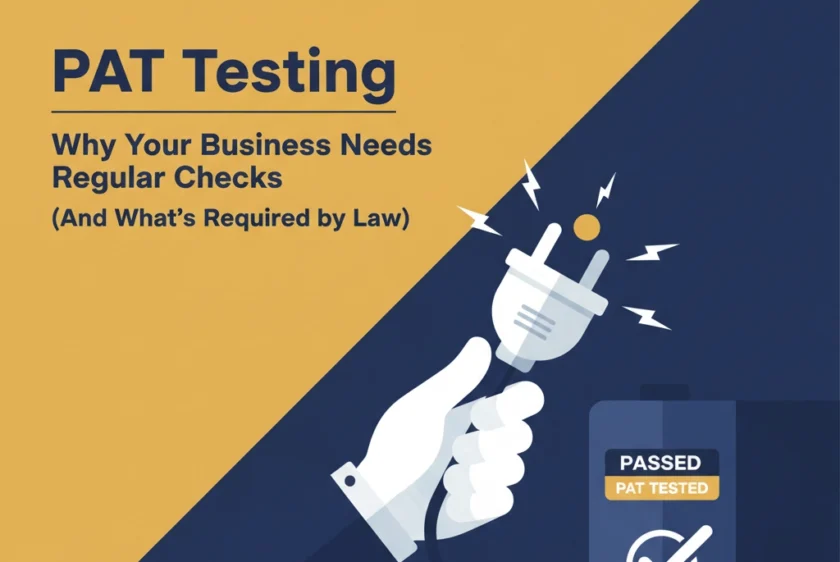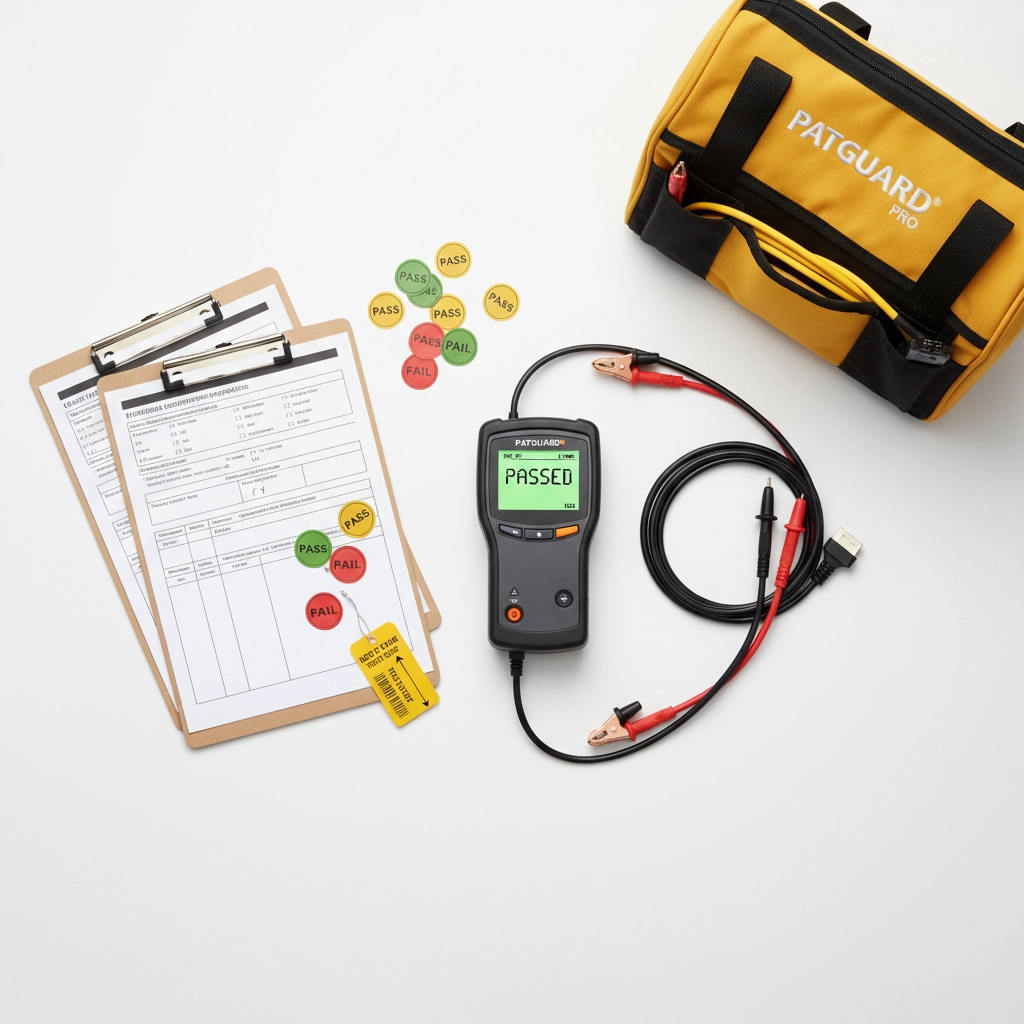
PAT Testing: Why Your Business Needs Regular Checks (And What's Required by Law)
If you run a business, you've probably heard about PAT testing. But what exactly is it, and do you actually need it? The short answer: yes, you do. While there's no specific law saying "you must PAT test," you have a legal duty under the Electricity at Work Regulations 1989 to keep all electrical equipment safe. PAT testing is the best way to prove you're doing this.
Let's break down everything you need to know about PAT testing for businesses and why it's not just good practice: it's essential.
What Is PAT Testing?
PAT stands for Portable Appliance Testing. It's basically a safety check for any electrical equipment that plugs into a wall socket. We're talking about everything from office computers and printers to kettles, microwaves, power tools, and extension leads.
A PAT testing service involves visual inspections and electrical tests to make sure your appliances won't electrocute anyone or start fires. Pretty important stuff, right?
The Legal Side: What You Actually Need to Know
Here's where it gets interesting. There's no law that explicitly says "you must PAT test." But: and this is a big but: several regulations create a legal duty that PAT testing helps you meet:
The Electricity at Work Regulations 1989 require that electrical systems are "maintained so as to prevent, so far as is reasonably practicable, such danger."
The Health and Safety at Work Act 1974 makes employers responsible for the safety of their workers and anyone else who might be affected by their work activities.
The Management of Health and Safety at Work Regulations 1999 require risk assessments and appropriate preventive measures.
Translation: If someone gets hurt by faulty electrical equipment in your workplace, and you can't prove you've been maintaining it properly, you're in serious trouble.
Different Rules for Different Businesses
Not all businesses are the same when it comes to commercial PAT testing requirements. The risk level of your workplace determines how often you need testing:
Low-Risk Environments
- Offices: Every 2-4 years
- Schools (admin areas): Every 2-4 years
- Hotels (bedrooms): Every 2-4 years
Medium-Risk Environments
- Schools (general): Every 12 months
- Shops: Every 12 months
- Restaurants: Every 12 months
High-Risk Environments
- Construction sites: Every 3 months
- Industrial environments: Every 3-6 months
- Commercial kitchens: Every 6-12 months
PAT testing for landlords is particularly important. If you rent out commercial properties, you need to ensure all provided electrical equipment is safe and regularly tested.
What Happens During PAT Testing?
When you book a PAT testing company, here's what they'll do:
Visual Inspection: Checking for obvious damage like frayed cables, cracked plugs, or burn marks.
Electrical Testing: Using specialized equipment to test insulation resistance, earth continuity, and other electrical safety aspects.
Documentation: Creating records of every test, with pass/fail results.
Labelling: Sticking labels on tested equipment showing the test date and next due date.
The whole process is pretty quick: most appliances take just a few minutes each.
PAT Test Certificates and Record Keeping
One of the most important parts of electrical appliance testing is keeping proper records. You need:
- A register of all appliances tested
- PAT test certificates showing results
- Labels on equipment showing test dates
- Records kept for at least 2 years
If the Health and Safety Executive (HSE) comes knocking, these records are what they'll want to see. No records = big problems.
PAT Testing Costs: What to Expect
PAT testing cost varies depending on several factors:
- Number of appliances
- Location and accessibility
- Type of business
- Frequency of testing required
Generally, you're looking at £1-3 per appliance for basic testing. For a typical small office with 50 appliances, that's £50-150 every few years. Pretty reasonable when you consider the alternative: potential fines, legal action, or worse, someone getting seriously hurt.
Many companies offer package deals for regular testing, which can work out cheaper in the long run.
Why Businesses Skip PAT Testing (And Why They Shouldn't)
We've heard all the excuses:
"It's too expensive." Actually, it's pretty cheap compared to the potential costs of not doing it.
"We don't have time." Most PAT testing services can work around your business hours.
"Our equipment is new." New doesn't mean safe: cables get damaged, plugs wear out, things happen.
"Nothing's ever gone wrong before." That's exactly when things do go wrong.
PAT Testing in the Newcastle Area
If you're looking for PAT testing Newcastle services, you want someone local who understands the specific needs of North East businesses. Local providers can often offer:
- Faster response times
- Better understanding of local business types
- More flexible scheduling
- Ongoing relationships for regular testing
PAT testing near me searches are popular because businesses want reliable, local contractors they can build relationships with.
Office PAT Testing: Special Considerations
Office PAT testing has its own quirks. Typical office equipment includes:
- Computers and monitors
- Printers and scanners
- Phone chargers
- Kitchen appliances (kettles, microwaves, fridges)
- Desk lamps
- Extension leads and power strips
The good news is that office environments are generally low-risk, so testing frequency can be every 2-4 years. The bad news is that offices often have loads of equipment, so the job can take a while.
What Happens If You Don't PAT Test?
Let's be blunt about the consequences of skipping portable appliance inspection:
Legal Action: HSE can prosecute for breaches of health and safety regulations. Fines can be unlimited for serious offenses.
Insurance Issues: Many business insurance policies require evidence of proper electrical maintenance. No PAT testing records might mean no insurance payout.
Liability: If someone is injured by faulty equipment, you could face personal injury claims.
Business Disruption: Having to shut down operations while safety issues are resolved.
Reputation Damage: Nobody wants to work with or buy from a business that doesn't take safety seriously.
Getting Started with PAT Testing
Ready to get your commercial PAT testing sorted? Here's what to do:
Step 1: Make a list of all your electrical equipment.
Step 2: Assess your risk level to determine testing frequency.
Step 3: Find a qualified PAT testing company in your area.
Step 4: Book your testing and make sure all equipment is accessible.
Step 5: Keep all records and certificates somewhere safe.
Step 6: Set reminders for when retesting is due.
The Bottom Line
PAT testing isn't just a legal requirement: it's common sense. The small cost and minimal disruption are nothing compared to the potential consequences of faulty electrical equipment.
Whether you're running a small office in Newcastle, managing multiple commercial properties, or operating an industrial facility, regular PAT testing for businesses should be part of your routine maintenance.
Don't wait for something to go wrong. Get your PAT testing sorted now, keep your people safe, and sleep better knowing you're compliant with the law.
Looking for reliable electrical appliance testing in the North East? Get in touch with Nifty Fixes North East for professional PAT testing services that keep your business safe and compliant.




